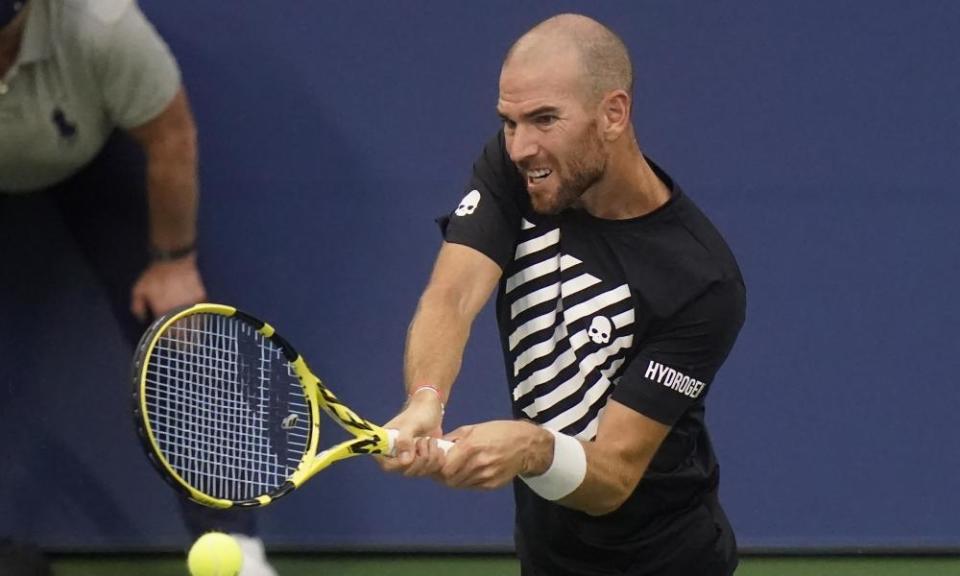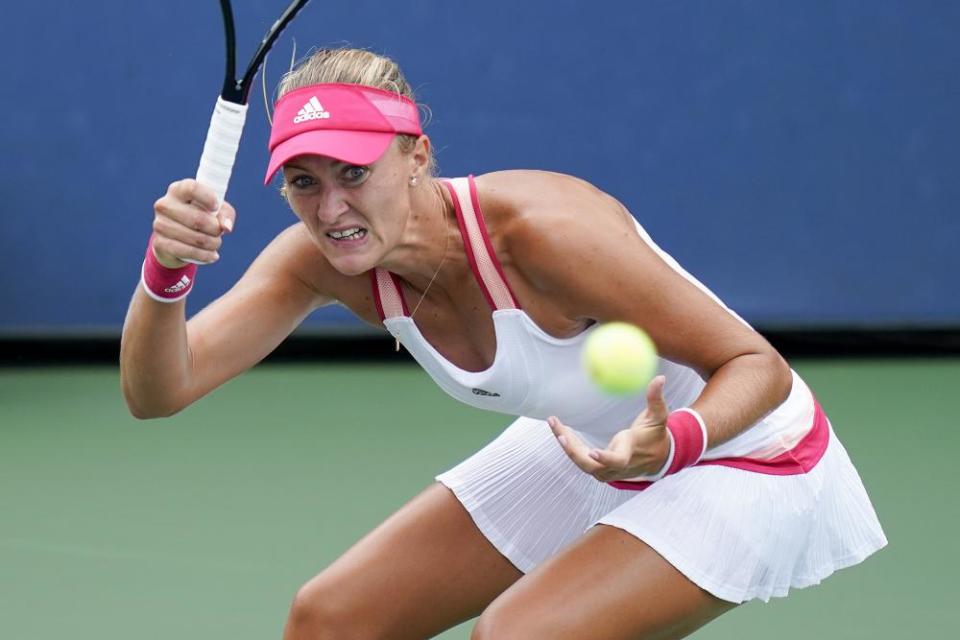Farcical Adrian Mannarino delay and social media circus overshadow US Open

The Great Mannarino Mystery should have been no matryoshka moment, no doll-within-a-doll episode of Poirot in Lockdown City, but an open discussion about the haunting issue of this 2020 US Open: the virus and its fallout.
Instead, the United States Tennis Association was temporarily paralysed by commercial sensitivity and legal timidity when New York health suits decided they wanted a walk-on part in the drama, and engaged Adrian Mannarino in discussions that dragged on for so long his third-round match against Alexander Zverev started nearly three hours late. He lost. So did tennis. It was a look-at-me moment for one set of anonymous pen-pushers, an avoidable cock-up for others.
Related: Andy Murray still dreaming big despite heavy defeat at US Open
The USTA statement had to be dragged from its chiefs and fell into inboxes with all the impact of a day-old cheese roll. It was, they whispered, a “collaborative dialogue” that intervened in their schedule, but they were not at liberty to say more because of “the sensitivity of the medical issues involved”.
This was the same sort of stonewalling that prevented them from even naming Benoît Paire when everyone knew the socially expansive Frenchman had tested positive for Covid-19, and had been seen playing cards for an hour with a table-full of his compatriots and others. That clicked the tournament protocols and banged seven of them up in their own personal, room-serviced hell. One group even had the added fun of four weddings in their team hotel – and no funerals, as far as we know.
Here’s the paradox: the USTA has done a phenomenal job even staging this tournament. Scores of egos have been accommodated and coddled in empty stadiums that somehow still have generated great tennis across all the courts. Inspired, granted, by the potential loss of $120m in worldwide TV revenue, the organisers got it on. Most of those who left it until the last minute to come to New York in the middle of a pandemic have coped and delivered.
Poor Mannarino handled it better than most. “Unfortunately I lost the match,” he said. “But still, I’m happy I was on court.”
Dan Evans, a social creature if ever there was, spoke sensibly – as did other Britons, including Andy Murray, Cam Norrie, Kyle Edmund, Johanna Konta and Heather Watson, all of them now unfortunately on their way home to have more coronavirus tests before heading to Rome and Paris.
An intriguing TV discussion in the middle of this rolling debate accidentally posed a relevant question: should young players of serious ambition throw away the baggage of social media to concentrate on their tennis?
The sensible answer is: yes. The response from this generation would be: no way, José. Yet it appeared to be, in part, the non-stop buzz on Instagram, Twitter and elsewhere that fed into the cabin-fever anxiety of Kristina Mladenovic, when the 30th seed told the world she felt like a prisoner in her paid-for hotel after blowing a 6-1, 5-1 lead – from 15-0 on her own serve – against 20-year-old Russian slam debutant Varvara Gracheva, who bagelled her in the third set. It was one of the truly great sporting meltdowns of our time.
Mladenovic maybe hoped her Munch scream would release her, psychologically, from her “nightmare”. She just wanted to “get my freedom back”. Inconveniently, as a member of the Paire 7, she can’t leave the country until Friday. For someone who speaks French, English, Serbian, Italian, Spanish and a bit of Russian, she struggles in the language of common sense.

Elsewhere there were hysterical – and totally wrong – social media rumours that Kirsten Flipkens had tried to flee the country and was sighted with her bags at the airport. Welcome to the crazy world of instant analysis. A neural tic – or virus, if you like – it induces the spread of naggingly constant rubbish and stuffs our brains with a stream of bilge that spills out into a sea of disinformation like toxic plastic.
Statistics show, apparently, that the great champions of modern sport were born in the 80s: young enough to be imbued with the snail-pace discipline of the preceding era, old enough to be immune from the distractions of Twitter and its cousins.
Old hard heads such as Murray, Roger Federer and Rafael Nadal have staff to communicate their occasional thoughts. In his enforced longueur, Murray did dip more regularly into the world of click, look and listen, but generally it is the next generation who flood the debate with their gobbets of quick wisdom. It’s turned some of them into underachieving neurotics.
A French player of obviously calmer disposition than Mladenovic, the 20-year-old Corentin Moutet, put it perfectly after holding his nerve to beat Evans on Friday: “OK, we don’t have our freedom, but there are way more important things going on right now than our wellbeing during the tournament. I think we need to follow the rules. We need to accept it. It’s not that big of a deal.”
Say hello to the new David Foster Wallace.

 Yahoo Sport
Yahoo Sport 





































